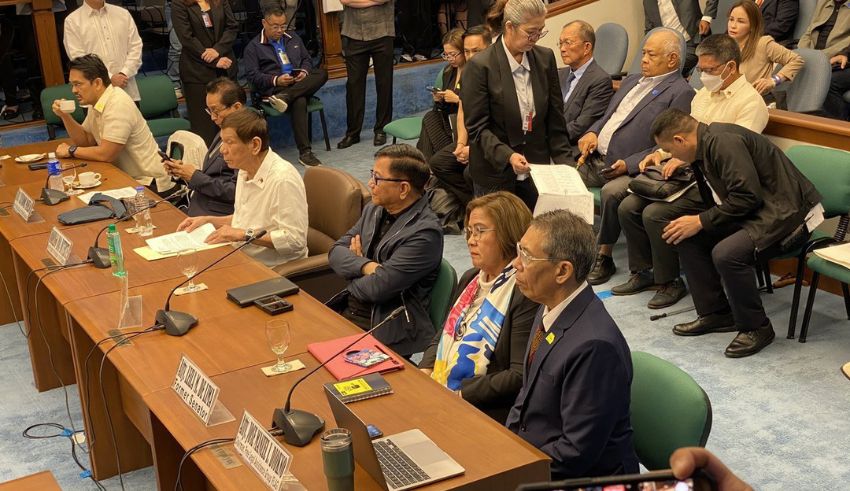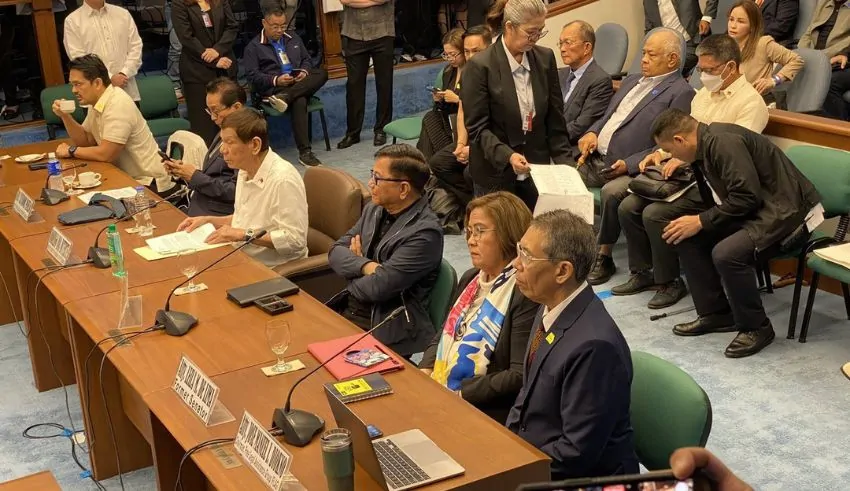

(C) Senate
Former Philippine President Rodrigo Duterte made a stirring speech at a much awaited Senate blue ribbon subcommittee hearing, claiming “full, legal responsibility” for all activities carried out under his government’s dubious war on drugs. Duterte, who presided over the Philippines from 2016 to 2022, asked to show up as a “witness,” highlighting his exclusive authority behind the forceful campaign aiming at illegal narcotics all throughout the nation. Declaring with unflinching determination, “I and I alone, take complete legal responsibility for all the police had done pursuant to my instruction. I should be the one behind incarceration; I will be responsible. Not hold the cops responsible for merely doing as directed. They were merely working as expected.”
Duterte’s fixation on sharing accountability for the drug war is meant to safeguard the law enforcement officials assigned to carry out his orders. For many Filipinos, this sentence marks a turning point in recognizing responsibility within the dubious anti-drug campaign, which claimed many lives. His public admission of legal responsibility indicates his continuous dedication to protect the campaign independent of continuous scrutiny it suffers.
Duterte underlined in his testimony his great respect for the law enforcement personnel who followed his commands, stressing once more that they acted under his clear direction and should not suffer the whole consequences of their activities. Emphasizing that he was finally accountable for the tactics and results of the anti-drug operations, the former President’s comments put the weight on himself. He reminded the Senate that his campaign sought to safeguard national security and face a major societal concern. “I did what I had to do for my country,” Duterte stated, stressing that he alone bears all the responsibility for the outcomes.
Duterte’s defense of law enforcement mirrors his larger perspective on government and leadership, in which he holds he has to protect those who carried out his orders in line of duty. Declaring that they behaved as extensions of his policy rather than autonomous agents, his comment seeks to give the police legal and moral immunity. Emphasizing that his anti-drug campaign was meant to protect the Filipino public from the threats presented by illegal drugs, Duterte also positioned it as an issue of national protection.
Speaking honestly, Duterte kept defending his government’s war on drugs, calling it as a reaction to safeguard common Filipinos. “My mandate as President of the Republic was to protect the country and the Filipino people,” Duterte said. “Don’t challenge my policies since I have no apologies or justifications. I carried out my required action. In this speech, Duterte insisted unequivocally that his controversial response to the drug epidemic sprang from his obligation to protect national security. He said that the relentless attitude of his government was necessary to solve the ingrained drug issues hurting the nation.
Unlike popular belief, Duterte stated that the war on drugs was about stopping harm to vulnerable people inside Filipino society rather than about imposing violence. “The war on drugs is not about killing people,” the former President said. It is concerning defending the defenseless and the innocent. He went on to say that rather than aiming to kill people, the campaign’s goal was to eradicate harmful drugs from entire communities. “The war on drugs is about the eradication of illegal substances such shabu, cocaine, heroin, marijuana, party drugs, and the like,” Duterte said.
This clarification sought to reinterpret the campaign as a public health and safety effort instead of a cruel campaign. Duterte claimed that his government aimed to sabotage the supply lines of illegal drugs that seriously threatened society, particularly to young Filipinos, therefore upsetting the balance. Emphasizing this facet of the drug war, Duterte aimed to change the story around the campaign by stressing its protective goals instead of its aggressive connotations.
Duterte went over the guidelines he issued military men and police, stressing the need of not utilizing their authority in line with He did, however, clarify that, should it be necessary—especially if drug suspects were armed or presented a threat—officers were authorized to “overcome the resistance” of drug suspects. If you believe you will die and if there is a gun, shoot the perpetrator. Aim him straight forward in the head. Eliminate him. At least, Duterte added, stressing his conviction in a strong reaction to threats against law enforcement personnel, there is one fewer criminal in the community.
From his work as a fiscal and subsequently as a professor at a police academy, Duterte said, this strategy aligned with his long-standing values. His instructions aimed to equip law enforcement personnel to safeguard themselves in life-threatening events, therefore giving their safety top priority. Emphasizing self-defense and public safety as fundamental values in his anti-drug campaign, Duterte sought to clarify the circumstances under which violence was judged acceptable by revealing these guidelines.
Duterte, with his strict rules, showed compassion for people struggling with drug addiction and presented them as victims in need of medical help instead of criminals worthy of punishment. He expressed his strong disgust for illegal substances and those who profit from them, but he set this feeling apart from his view of drug users. “I despise drugs, no doubt about it. Duterte said he hates the merchants, the vendors, and the pushers of this hateful group. “But I see drug dependents as victims requiring medical assistance.”
Reflecting a sophisticated approach that targeted producers and distributors rather than consumers, this sympathetic outlook was a major component of his anti-drug posture. Duterte claims that his dedication to eradicate drugs resulted from a “covenant” he made to the Filipino people during his 2016 presidential campaign—a promise to protect them from the perils of addiction. By expressing this point of view, Duterte aimed to underline how his government treats drug addicts as people in need of treatment and rehabilitation instead of as offenders subject for punishment.
There has been much national and international discussion on Duterte’s anti-drug campaign. Official Philippine government statistics show at least 6,200 drug suspects dead from June 2016 through November 2021 during police operations. Human rights groups contest these numbers, meanwhile, believing the death toll might be as high as 30,000 including reportedly linked undocumented killings connected to the drug campaign. These differences have sharpened debates on the moral and legal ramifications of Duterte’s actions since detractors point to the effects on underprivileged areas and challenge the general campaign responsibility.
Duterte’s public admission of responsibility is probably meant to silence some of these issues by establishing himself as the principal person in charge of the results of the anti-drug campaigns. His words show an attempt to settle the argument and protect law enforcement agents following his orders.
Duterte’s statement before the Senate emphasizes his ongoing impact on Philippine society, especially on determining the country’s policy on drug-related problems. His uncompromising posture could have long-lasting effects on the political environment of the nation and set a standard for next debates on law enforcement responsibility and the part government policies play in resolving public health concerns. For Duterte, his legacy still revolves around his resolve to defend Filipinos—a dedication he says justifies the actions he took during his presidency.
Declaring his complete legal responsibility, Duterte has centered the controversial measures of his government at the center of Philippine political debate, therefore reaffirming his conviction that these steps were essential to protect the country. His statement reminds us strongly of the difficult and sometimes divisive nature of government, where choices made for public safety can have major effects and ongoing criticism.
The Ministry of Foreign Affairs (MFA) in Singapore has upped its travel warning for Singaporeans by advising against travelling to…
With the aim of honoring the stellar performers and achievers in the music industry of South Korea, the yearly prestigious…
Children’s favourite and globally acclaimed ‘Cocomelon’ is known for their appealing animated videos which features nursery rhymes, educational songs, and…
ExecuJet MRO Services Malaysia has a reason to smile as its maintenance, repair and overhaul (MRO) received the Japan Civil…
Sony is known for catering premium quality in all types of electronics products they make for their users with their…
The European Union and Singapore agreed to a transformative Digital Trade Agreement which serves to deepen their economic relations through…
This website uses cookies.
Read More